Strengthening the Relationship Between Patients and Caregivers – The Schwartz Center for Compassionate Healthcare
Liz Suneby writer
Eric Barry photographer

In november 1994, Boston-based health care attorney Kenneth Schwartz was diagnosed with lung cancer. During his 10-month ordeal, Ken came to realize that what matters most during treatment of an illness is the human connection with professional caregivers. As Ken explained in an article he wrote for The Boston Globe Magazine called “A Patient’s Story,” (July 16, 1995) “the smallest acts of kindness made the unbearable bearable.”
Shortly before his death, Ken outlined the organization he wanted created in his memory—a center that would nurture compassion in medicine, encouraging the sorts of caregiver/patient relationships that made all the difference to him. The Schwartz Center for Compassionate Healthcare was started in 1996 by Ken’s family, friends, and principal caregivers at Massachusetts General Hospital, including Ken’s sister-in-law, Marjorie Stanzler of Wellesley, the first staff member of the Center.
The Schwartz Center’s mission is simple but compelling: to promote compassionate health care so that patients and their professional caregivers relate to one another in a way that provides hope to the patient, support to caregivers, and sustenance to the healing process. To that end, the Center runs programs to improve communication between caregivers and patients, encourage caregiver compassion and empathy, disseminate best practices, and ensure that humanistic care is on the national health care agenda. As pediatric oncology nurse Helen Mullen, who the Schwartz Center recognized for her outstanding compassion, explains, “I find it remarkable that [Ken Schwartz] had the vision to start something as important as the Schwartz Center. We go to school to learn how to do things, but to take care of a person physically, emotionally, and spiritually is a whole different aspect [of caregiving].”
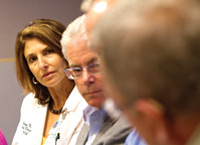
For its 15th anniversary in the fall of 2010, the Schwartz Center commissioned a national poll of patients and doctors on the state of compassionate health care. Perhaps the most striking finding is that 81 percent of patients and 71 percent of doctors believe that compassionate care can make a difference in whether a patient lives or dies. Despite consensus on its importance, only 53 percent of patients and 58 percent of doctors believe the U.S. health care system provides compassionate care. And, even more disconcerting, patients and doctors fear that the changes taking place in the health care system will make it even more difficult for caregivers to provide compassionate care in the future. Schwartz Center Executive Director Julie Rosen views the results as marching orders for the organization: “The poll confirms that we have our work cut out for us to ensure that our constantly changing health care system ensures compassionate care for each and every patient.” Dr. Ron Vender, Chief Medical Officer at Yale Medical Group, and a cancer survivor himself, validates the need for the pioneering work of the Schwartz Center. “Too many of us define our jobs too narrowly— as taking care of the physical ailment—and losing sight of the emotional, psychological, and spiritual element of illness,” he says.
The Schwartz Center’s flagship program is called Schwartz Center Rounds®. In contrast to traditional medical rounds, the focus of Schwartz Center Rounds is on the human dimension of medicine. In this unique multidisciplinary forum, clinical caregivers come together to talk about difficult social and emotional issues that arise in patient care. Physicians, nurses, social workers, psychologists, allied health professionals, and chaplains, among others, listen to a panel’s brief presentation on a patient case or topic and then are invited to share their own perspectives in a facilitated discussion. For most caregivers, these Rounds are the only structured outlet for expressing their thoughts and feelings and the only forum they have to discuss the difficult communication issues that are an inevitable part of patient care.
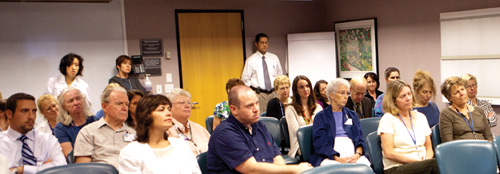
Schwartz Center Rounds started at Massachusetts General Hospital and currently take place at more than 245 hospitals and outpatient facilities in 35 states as well as at several hospitals in the United Kingdom. Newton-Wellesley Hospital is one of the 245, where Dr. Aran Kadar, a pulmonary/critical care specialist, is the physician leader/co-chair. Dr. Kadar has been involved in Rounds since he arrived at Newton-Wellesley: “I was drawn to Rounds as an outlet for the frustration of difficult ICU cases, and the need for some form of group reflection on those cases. I work with providers who care deeply about patients and value the opportunity to reflect on hard cases in a way that I believe is integral to preventing burnout and encouraging compassionate care.” Dr. Kadar referred to a two-part series on malpractice as being particularly helpful. “One physician spoke about the experience of being sued, and the difficulties involved even though he was found not guilty. The next Rounds was a discussion with a physician who had been sued and found guilty. Amazing to see how both physicians, who are role models in their fields, dealt with these circumstances and managed to get back to work.”
Rounds participants across the country echo Dr. Kadar’s perspective on the positive impact of the program on caregivers. In a survey, 84 percent reported feeling more compassionate toward patients and their families; 87 percent came away with new ideas and strategies for challenging patient situations; and 93 percent gained new appreciation for the knowledge of colleagues from other disciplines. Apparently, news of the success of the program is spreading, as demand for Rounds is increasing across the country and, in fact, the world. According to Marjorie Stanzler, currently the Senior Director of Programs at the Schwartz Center, “It’s good news, bad news… it shows how valuable the Rounds are for caregivers in today’s stressful health care environment, but we actually have more demand than we can meet with our current resources.”
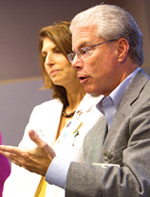
In addition to Rounds, the Schwartz Center funds grants for innovative programs that improve the patient/caregiver relationship in the areas of communication skills, cultural competency, spirituality, and end-of-life care. Since 1997, the Schwartz Center has awarded 160 grants to more than 100 nonprofit organizations, typically in the $10,000 to $20,000 range. Any health-related organization in the country is eligible to apply, but priority is currently given to nonprofit institutions that offer Schwartz Center Rounds and to proposals for programs that utilize patients and/or family members as educators for clinicians. One of the most effective grants in this area supported the development of the “Families as Educators” retreat curriculum for parents of children living with life-threatening conditions and health care professionals. The goal was to advance institutional improvements in pediatric palliative care and, to date, successful retreats with almost 2,000 clinicians and more than 300 family members have been held across the U.S., and Canada.
Another important and prestigious program of the Center is The Schwartz Center Compassionate Caregiver Award®—an honor given to a caregiver in New England who displays extraordinary compassion in caring for patients. Eliane Markoff of Wellesley, currently a member of the Schwartz Center Leadership Council, nominated the first recipient of the Compassionate Caregiver Award—Pediatric Neurologist Dr. Scott Pomeroy of Children’s Hospital in Boston – in 1999. Dr. Pomeroy treated Eliane’s daughter, Rachel Markoff, who in 1992, one week short of her ninth birthday, died of a brain tumor. Eliane expresses her reasons for nominating Dr. Pomeroy: “Rachel always loved seeing Dr. Pomeroy. She looked forward to his visits because he was such a great listener and truly compassionate. My family was so pleased that he was awarded the first Compassionate Caregiver Award despite how painful it was for me to see him again at the Schwartz Center annual dinner where I cried a good part of the night.” Dr. Pomeroy explains his approach to patient care: “I try to see things holistically and focus on more than the symptoms and the diagnosis. I want to know how the illness affects my patients’ lives and the lives of their families.” Today, Eliane has the honor of interviewing the five finalists for the annual Compassionate Caregiver Award and considers it a great privilege to meet wonderful people who truly make a difference through their work.
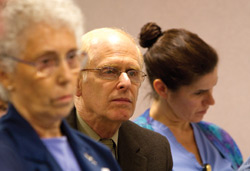
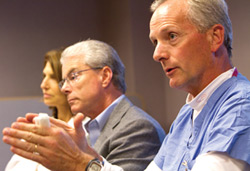
Schwartz Center Board member Reverend Judy Swahnberg of Wellesley also participates in the Review Committee for the Compassionate Caregiver Award. Reading Ken Schwartz’s story in The Boston Globe Magazine was a defining moment in Judy’s life and an important influence in her decision to attend divinity school. Judy couldn’t part with Ken’s story and, in fact, kept it in view on her desk where a friend saw it and told her that a center had been started in Ken’s name. The following excerpts from Ken’s story which Judy found so moving are a privilege to share again.
UNTIL LAST FALL, I had spent a considerable part of my career as a health care lawyer, first in state government and then in the private sector. I came to know a lot about health-care policy and management, government regulations and contracts. But I knew little about the delivery of care. All that changed on November 7, 1994, when, at age 40 I was diagnosed with advanced lung cancer. In the months that followed, I was subjected to chemotherapy, radiation, surgery, and news of all kinds, most of it bad. It has been a harrowing experience for me and for my family. And yet, the ordeal has been punctuated by moments of exquisite compassion. I have been the recipient of an extraordinary array of human and humane responses to my plight. These acts of kindness — the simple human touch from my caregivers — have made the unbearable bearable.
…I told him [Ken’s oncologist] at the meeting that while I had no illusions, I was deeply moved by his refusal to give up and by his abiding hope; I was especially affected because such hopefulness was not coming from a faith healer but a distinguished researcher. He had strengthened our resolve to fight.
…While doctors managed my medical care, my day-to-day quality of life and comfort were in the hands of two or three nurses. These nurses showed competence and pride in their work, but they also took a personal interest in me. It gave me an enormous boost, and while I do not believe that hope and comfort alone can overcome cancer, it certainly made a huge difference to me during my time in the hospital.
…I also asked him if he thought I should be doing more to prepare for the possibility of an early death. He looked perplexed and asked, ‘‘Have you prepared your will?’’ I said yes. ‘‘Are your affairs otherwise in order?’’ I again said yes. ‘‘So it sounds like you are prepared.
…Remember, death is a minor matter. Living … that’s the challenge.’’
…If I have learned anything, it is that we never know when, how, or whom a serious illness will strike. If and when it does, each one of us wants not simply the best possible care for our body but for our whole being.
Excerpts from “A Patient’s Story,” written by Ken Schwartz and published in The Boston Globe Magazine, July 16, 1995. ![]()
Schwartz Center Rounds
© 2011 Elm Bank Media | Beth Furman, Publisher | Beth@ElmBankMedia.com


recent comments